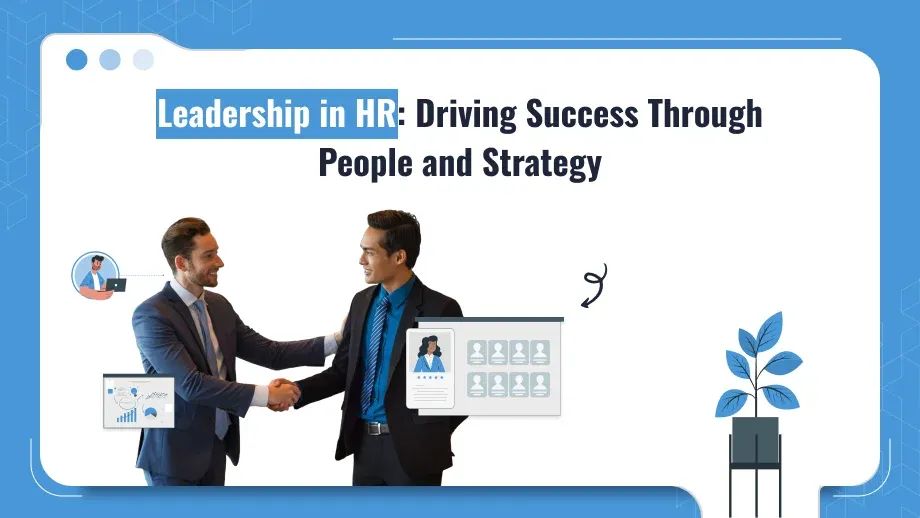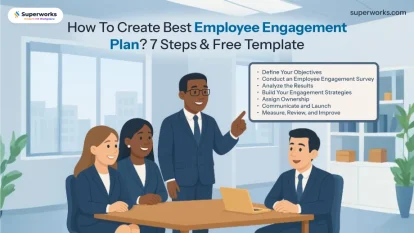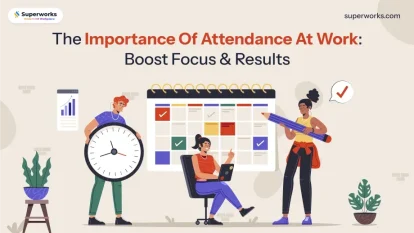
Introduction
What sets apart great organizations from average ones? A strong and effective leadership in HR. Human resources leadership has evolved from being just an administrative function to a strategic driver of business success today. HR leaders are at the fore, shaping company culture, driving employee engagement, and aligning talent strategy in support of organizational goals.
This piece discusses what good leadership in HR is, the essential skills an HR leader should possess, their impact on business success, and how they drive workplace culture. It will also touch on actionable insights on emerging trends in HR leadership and tips on how to improve one’s leadership in human resource management.
What is Good Leadership in HR?
Good leadership in HR is so much more than just the day-to-day paperwork. It’s to understand the business, guide employees, and create a prospering environment at work. Here’s what defines great leadership in human resources:
-
Seeing HR in the Business Context
HR leaders who understand the broader business strategy can align HR practices with organizational goals. This includes designing human resource policies and programs that directly support growth and profitability.
Strategic thinking always helps HR leaders predict workforce trends and plan. Succession planning, skill gap analysis, and recruitment strategies have to stay ahead, or the organization will lag.
Work is highly characterized by high turnover rates, dissatisfaction, and talent gaps. Such problems require innovative solutions. HR leaders are adept at problem-solving and address these issues efficiently.
HR leadership in HR means to be a trusted advisor among employees and management. This requires providing advice on HR policies, compliance, and employee relations, to support informed decision-making.
-
Championing Organizational Culture
An organizational culture, which may be a very important instrument for bringing the company’s mission and values across, is something that is strongly encouraged by HR leaders. This often involves leading initiatives that foster inclusivity, innovation, and collaboration.
-
Being Results-Oriented and Taking Initiative
Effective HR leaders drive measurable results. They set a specific goal for every human resource practice: whether it is to enhance engagement scores, reduce turnover, or improve productivity.
-
Supporting Employees’ Success
Employee growth is key to organizational success. HR leaders who treat career development programs and mentoring as top priorities ensure their employees feel valued and motivated.
Empathy is a typical characteristic of effective HR leadership. Hence, in terms of their understanding of workers’ needs, empathy drives trust and lets employees hear themselves and be heard.
Each of these traits, then, is what makes for effective leadership in human resource management -making sure that the organization prospers in a rapidly changing business environment.
Transform Leadership in HR with Superworks HRMS Solutions!
Join 200+ companies boosting employee satisfaction and streamlining HR processes with ease.
Basic Leadership Skills for HR Professionals
To be effective as a leader, experts in human resource management must have a mix of technical knowledge and soft skills. Here are the skills required for human resource leadership:
- Strategic Thinking
HR leaders must align talent strategies with organizational goals. This involves anticipating workforce needs, planning for future trends, and aligning HR initiatives with long-term objectives.
- Communication
Strong communication skills are essential for conveying policies, negotiating with stakeholders, and inspiring employees. Clear communication builds trust and ensures alignment across teams.
- Adaptability
In a world where the workplace evolves rapidly, adaptability is critical. HR leaders must navigate technological changes, shifting workforce expectations, and external challenges.
- Conflict Resolution
Resolving workplace conflicts in a fair and timely manner fosters harmony and ensures employee satisfaction. A good HR leader needs to manage issues and complaints effectively.
- Emotional Intelligence
Emotionally intelligent HR leaders have the ability to understand the emotions of employees, regulate their own emotions, and navigate interpersonal dynamics. Such a trait is necessary for healthy relationships.
These skills equip HR professionals to handle complex situations and position themselves as trusted leaders in human resource model management.
Contribution of HR Leadership to Business Development
HR leadership impacts the success of an organization in business directly, through, inter alia:
Leadership in HR plays a vital role in maintaining employee engagement by creating a positive work environment, professional and personal growth, and ensuring transparency. HR leaders with these qualities can boost morale and productivity.
-
Improving Retention Rates
For many organizations, retaining top talent is one of the major issues. HR leaders who address employee concerns and invest in their professional and personal development make sure employees are loyal to the company.
This includes making a creative and collaborative culture. They empower the employees to bring out ideas and implement them in a calculated manner.
-
Talent Management with Business Requirements
HR leadership keeps recruitment, development, and retention programs for the workforce that deliver results in line with the organization’s business requirements.
One example is how companies implement Human Resource Specialist to optimize HR processes. These systems enable automated work that allows HR leaders to serve strategic priorities set to performance at the bottom line.
Key Roles of Leadership in HRM
Leadership in human resource management refers to the assumption of responsibility and authority over critical tasks that impact the overall outcome of an organization. HR leaders are not managers but visionaries, strategists, and change agents. Below are the key roles that define leadership in HRM:
1. Strategic Partner
HR leaders are therefore strategic partners to the organization’s leadership in HR team. They align the human resource practice of an organization with business goals. Here, workforce strategies are in support of company objectives. By understanding the business context, HR leaders help organizations plan for future needs, such as talent acquisition and workforce development. This role puts significance to human resource leadership to the gap that rests between people and business strategy.
2. Champion of Organizational Culture
The most important thing that HR Leadership Development does is create and maintain a positive workplace culture. HR leaders design initiatives to communicate the core values of the organization, but also to reinforce diversity, equity, and inclusion initiatives. For example, by advancing DEI programs, HR leaders will work to make sure that all employees feel valued and respected. This directly affects employee satisfaction and engagement, so their work makes a huge difference for the overall organization.
3. Change Agent
Organizations must constantly keep adapting to the constantly changing business environment, and thus, the function of the HR leaders becomes very crucial in managing such change. Whether adopting new technologies, restructuring teams, or adjusting policies, HR leaders oversee the organization’s transformation. They utilize tools such as human resource management software to streamline processes and encourage innovation.
4. Talent Developer
Talent development forms a critical human resource leadership and is what underlines the evolution of HRM. HR leaders are in charge of creating training programs, mentoring, and career development plans to help workers actualize their potential. This not only benefits the individuals but also organizational performance because a competent and motivated workforce is obtained.
5. Employee Advocate
A key aspect of leadership in HR is serving as the voice of employees. HR leaders make sure that the needs, concerns, and aspirations of employees are heard. This can be in the form of policies to work and live well, maintaining wellness programs, and proper compensations. Advocacy builds trust and boosts employee loyalty.
6. Compliance Officer
However, compliance is a crucial area of focus that guides leadership in human resources. HR leaders will ensure labor laws, ethical standards, and industry regulations are strictly followed by the organization. This involves having clear, comprehensive human resource policies and practices in place that protect the firm and its employees.
7. Workforce Planner
Workforce planning: The biggest role of HR leaders is in workforce planning, which involves forecasting talent needs, highlighting skill gaps, and succession planning. Utilizing HRMS payroll software in India has helped them be resourceful and plan for organizational growth.
Driving Workplace Culture Through HR Leadership
Workplace culture is the driving force behind any successful organization, and HR leadership plays a pivotal role in shaping it:
- Promoting diversity, equity, and inclusion:
Inclusive workplaces facilitate teamwork and innovation. HR leaders are DEI champions to ensure impartial hiring practices, fair policies, and diverse workplaces.
- Promotion of Learning and Development
HR leaders provide staff with training opportunities, mentoring, and career advancement. A learning culture keeps staff motivated and alert to change.
- Collaboration Nurturing
HR leaders facilitate team building as well as open communication systems, fostering workplaces that facilitate teamwork.
- Conflict Resolution in the Workplace
Addressing conflicts effectively ensures harmony and productivity within teams. HR leaders use mediation techniques to resolve disputes and rebuild trust.
This holistic approach aligns with best practices in Human Resource Practices, ensuring a productive and inclusive work environment.
Real-World Examples of Exceptional HR Leadership
Examples from successful organizations highlight the transformative power of HR leadership:
- A global financial services company increased employee satisfaction by 30% through a mentorship program led by HR leaders.
- A technology firm adopted Human Resource Management Software to automate administrative tasks, allowing HR leaders to focus on strategic initiatives.
- A healthcare organization improved retention by implementing flexible scheduling and wellness programs, demonstrating empathy and adaptability.
These examples point out how effective human resource leadership results in measurable and consequent improvements in the outcomes of an organization.
Emerging Trends in HR Leadership
Evolution of HR Leadership for Modernization of the Workforce. Here are some key trends:
HR leaders are now embracing the use of tools, such as HR Software India and AI-based analytics, to elevate decision-making and streamline HR work.
HR leaders have long considered the well-being of their employees as the most crucial aspect. Mental health, work-life balance, and wellness programs are fast becoming central to most HR strategies.
HR leaders need to face the reality of managing geographically distributed teams with remote and hybrid work arrangements. They must help employees stay engaged and ensure equity in terms of opportunities and support.
Developing future HR leaders is critical for long-term success. Programs that focus on situational leadership and growth-oriented HR models are becoming more prevalent.
By embracing these trends, HR leaders can stay ahead in the ever-changing field of human resource leadership.
Conclusion
Leadership in HR takes on the role of what has traditionally been. It inspires instead of traditional roles that drive innovation to create value for both the employee and the organization. The aspirant leader in HR will need strategic thinking and empathy.
This is where HR leaders would leverage tools like HRMS Payroll Software in India and engage in initiatives that drive engagement, innovation, and inclusion – all the while navigating challenges with meaningful impact. Whether an HR specialist or looking to lead, it is an alignment of people strategies with business goals and leading a thriving workplace culture.









